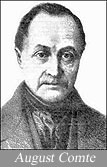|
|
|
||||||||||||||
|
|
|||||||||||||||
|
Ethics Homepage > Textbook > Comte |
|||||||||||||||
|
|
|||||||||||||||
|
|
 Philosophy 302: Ethics Philosophy 302: EthicsAugust Comte, "Positive Philosophy" Abstract: Societies and the sciences evolve in accordance with natural law through three stages: the theological-military, the metaphysical-transitional, and the scientific-industrial. Knowledge in any field of inquiry involves finding the laws of phenomena. 1. Explain Comte's three laws of development. 2. According to the law of the three stages, how does the metaphysical state differ from the religious state of understanding? Is it possible for a person to understand the world two different ways? 3. Clarify as precisely as possible Comte's description of the third stage of knowledge. Do you think Comte would endorse "the quest for certainty"?
That each branch of knowledge historically progresses through three mutually exclusive kinds of thinking: (1) the theological (based on supernatural absolute knowledge of final causes), (2) the metaphysical (based on abstract principles or forces of origin), and (3) the positive (based on reason and observation for discovery of laws of phenomena).
The metaphysical stage uses abstract entities structurally replacing the supernatural agents of the theological state. In the first, metaphysical entities account for the phenomena of the world; in the second, supernatural agent(s) produce the phenomena of the world. Comte suggests they are mutually exclusive ways of understanding--the first is teleological and the second is ontological.
In the third stage, the positive stage, science progresses by the explanation of increasing number of facts by decreasing number of laws of phenomena. Since the positive stage recognizes the impossibility of final causes and absolute truth, there would be no expectation of finding "absolute certainty" about phenomena and their variable relations. Recommended Sources Comte, August: The 1911 Encyclopædia. Discussion of Comte's life and work from the classic edition of the Encyclopædia Britannica. Paper Topics 1. Does Comte's explanation of
the Positive Philosophy commit the genetic fallacy? |
|||||||||||||
|
|||||||||||||||
| | Problems | Egoistic Theories | The Good | Duty Ethics | Utilitarianism | Rights | | |||||||||||||||
|
|
. |
|
|||||||||||||
